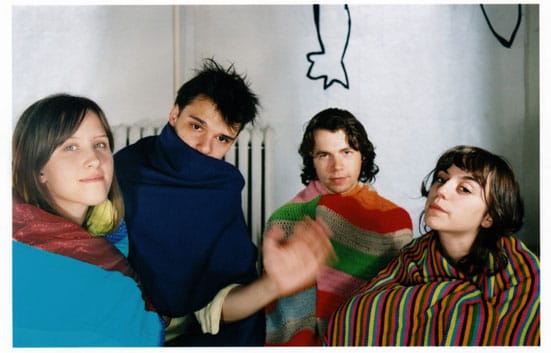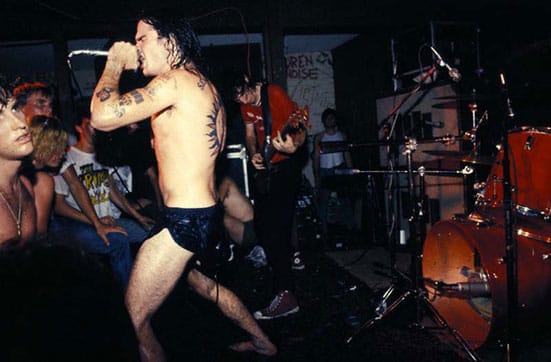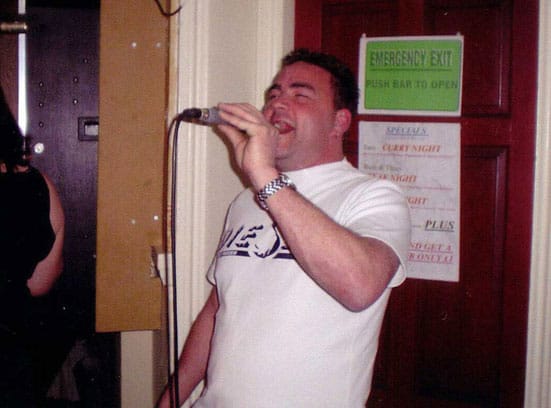The Dirty Projector's album 'Rise Above', released towards the end of last year, is a reimagining of another album; 'Damaged' by Black Flag. Dave Longstreth, the founder and front man of the Dirty Projectors, decided to embark upon the project after he found an empty cassette case of the seminal hardcore album when he was helping his parents move house a couple of years ago. It brought back nebulous, apolitical memories of his pre-pubescence and of his admiration for his older brother's angry disaffection; unsteady recollections of lyrics and riffs that were coded and shocking as a child - seditious and historically archetypal in retrospect. Rather than inspiring a re-purchase of the album - and a risky face-off of precious, preserved memory and cool adult cynicism - finding the cassette case, replete with inlay, prompted Longstreth to attempt to reimagine, based on his potentially wayward recollections, the entirety of the album, and to record and release it as a dubious descendent of the Black Flag original and the next Dirty Projectors album. The result is an astonishing listen, perhaps conveying something more about Longstreth's musical maturation than a sort of hardcore elegy - a revitalising of Greg Ginn's lyrics through a brazen musical paradigm shift, encountering African 'kwassa-kwassa', reggaeton, Andrew's Sisters' close-harmony, post-punk, prog, and Longstreth's inimitable voice. The meaning of the words - which emerge as explicit, sophisticated and insurgent once unshackled from Henry Rollin's pomp - is constant, but understood differently, both because of their definitively historical perspective, but also because of Longstreth's interpretative reclamation, both as a pre-pubescent and as a contemporary adult musician. It's a complicated process and a powerfully vivid outcome, one that contributes a hefty footnote to the project of translation, and acts as a challenge to the pre-eminence of irony in the musical 'cover'. By conjuring the spectre of a previous manifestation of himself as a music fan, Longstreth manages to document the effect and subsequent ingraining of music into the cultural and political life of an individual.
Perhaps more so than any other cultural experience, music is affected by a kind of subjective temporality, and can be indelibly inked into an involuntary memory, and recoverable only through an obscure catalyst - a Madeleine dipped in tea; an empty cassette case - that previously, perversely, acted as camouflage for that particular memory, concealing it from everyday access. Longstreth the child, stealing into a world of mutinous youth in Reagan's America - drinking, depression and emasculated ennui - acted as an uncomprehending voyeur to his brother's world. This musical and cultural tourism (and juvenilia) carry through to the Dirty Projector's 'Rise Above', maltreating the usually nonnegotiable hardcore myth to create something both revivifying and completely other.
Longstreth's personal appropriation of another artist's work brings closer the relationship between musician and audience - professional and amateur. Acting as both artist with intent, and listener remoulding the piece to his own image; Longstreth performs a pronominal sleight of hand, singing "We are born with a chance / And I cannot have my chance..." as both himself, Henry Rollins, the lyricist Greg Ginn, his prepubescent self, and, as we listen, us; all of them agglomerating under the banner of the first-person, and, more tellingly, 'we' the political flock.
Of course, singing someone else's songs always involves a complicated coalescing of identities. Karaoke - that drunken, musical soapbox - relies upon the attempted wresting of identity from the original singer; owning the song, gluing it to subjective life. This act seldom succeeds in exorcising the spectre of the composer or original performer, but it does stratify the song's history, contributing another singular voice to the chorus. Witness a crowd singing in ecstatic union at a gig, the singer on stage tilting their microphone towards the audience, silent themselves; awed by their own words - their voice - echoing in a thousand mouths. Each fan, once on their own and singing into their hairbrush, claims the song for themselves, privatising what is essentially public, and renouncing the singer's pronominal ascendancy in order to speak in their own first person. This and all the while maintaining the legend of the original singer in themselves - the audience member imagining they are the evangelical proto-self conjured in the song, setting the pattern for everyone else. This evokes the kind of authorial ambiguity of the oral tradition, where the source is unknown but celebrated, as a necessary, ever-present spectre - the kernel of an author, a sign-post to the story's future in the mouths and ears of others.
So, the popular music song exists, with the songwriter/original performer a myth of subjecthood, existing as the first "I" only, cast into the past and subsequently engulfed by the "I" of innumerable subjects. A sense of this process seems to inform a lot of rather rudimentary songwriting, where the composer might relinquish themselves in favour of a more homogeneous "I", easily digestible by as broad a spectrum of listeners as possible.' Yesterday' by The Beatles is the most covered song ever, with over 3,000 different artists recording their own version in the course of its relatively short, forty-year history. One possible explanation for this astonishing figure is the song's singularly bromide lyrics. The singer describes a succession of vague platitudes, ignorant perspectives and tepid metaphors, which culminate in a completely nebulous, flexible subject. This inhuman homogeneity lends itself perfectly to the appropriative act of the cover, allowing subsequent voices to furnish it with some much-needed context and character. Whether this manages to retrieve something worthy from McCartney's mulch is another matter. A familiar memory for me is of a series of amorphous tribute bands playing the village pub on consecutive Wednesday nights when I was a teenager. The set-list barely varied from act to act, comprising, as you might imagine, a collection of MOR and easy-listening hits, rendered in a fierce, American-accented baritone and accompanied by a faithful guitar-line dotted with derivative, proprietary quirks. 'Stairway to Heaven' is banned in guitar shops; 'Angels' by Robbie Williams is the most requested Karaoke song of all time in the UK.
What makes the Dirty Projector's 'reimagining' of Black Flag's album unique in one way is its disregard for the source material. The original 'Damaged' is in no way innocuous, preferring a deliberately radical, individuated 'scene' as its context - heterogeneous and hostile, as opposed to McCartney's wilful and ubiquitous banality. So, when Longstreth and co. strip back the thick veneers of reactionary politics, disillusionment and ostentation that characterise Black Flag, they access something fundamental at the heart of the songs. This core is flecked with Rollin's spittle; scoured by Ginn's guitar -bearing the residue of Black Flag's sovereignty - but is perfectly capable of supporting a different chassis of style and context. What Longstreth highlights with his revisionist, deliberately eccentric interpretation is just how much Black Flag-ness must be culled in order to lay claim to these songs. In the end, it's only the words that can fully remain; the potential of their being voiced just about holding back a reification of meaning and perspective. Filtered through Longstreth's memory - along with his own insidious intention - the words become transparent, ghostly; and the music - experimental, radical - fills them in, giving them an origin and a trajectory to follow. Like all really good covers, the songs on 'Rise Above' completely transcend their appropriative mantel. Knowing that they are covers (of a sort) does not negate their originality, but instead creates a weird, distorting provenance that lingers about the music like a haunting; superimposing histories and identities, documenting a conversation between the musician and the listener, intent and interpretation.
Ed Atkins

Dirty Projectors, circa. 2007

Black Flag playing live in 1981

"The drunken soap-box"